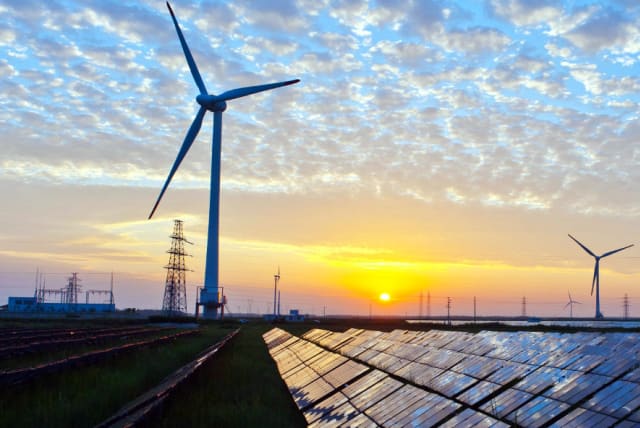World off track for reaching energy access goals by 2030 - report

“The poorest continue to suffer the most from climate injustice even though they are not the climate offenders,” said Yosef Abramowitz.
As many as 1.9 billion people will be without clean cooking and 660 million without access to electricity in 2030—mainly in Africa and the developing world—if swift and expansive action is not taken, according to a new international report.
“Tracking SDG 7: The Energy Progress Report” tracks progress toward the world achieving Sustainable Development Goal (SDG) 7, which calls for ensuring access to affordable, reliable, sustainable and modern energy.
The report - a joint effort of the International Energy Agency (IEA), the International Renewable Energy Agency (IRENA), the United Nations Statistics Division (UNSD), the World Bank, and the World Health Organization (WHO) - warns that despite some progress, current efforts are not enough to achieve any of the 2030 SDG 7 targets on time.
The results will “negatively impact the health of the most vulnerable populations and accelerate climate change,” the report said.
According to WHO, around 3.2 million people die annually from illnesses caused by using polluting fuels and technologies.
“We must protect the next generation by acting now,” said WHO Director-General Dr. Tedros Adhanom Ghebreyesus. “Investing in clean and renewable solutions to support universal energy access is how we can make real change. Clean cooking technologies in homes and reliable electricity in healthcare facilities can play a crucial role in protecting the health of our most vulnerable populations.”
“The poorest continue to suffer the most from climate injustice even though they are not the climate offenders,” said Yosef Abramowitz, a leading local climate activist, in response to the report. “Israeli innovation can fill in these massive global shortcomings.”
Even today, there are an estimated 675 million people without access to electricity and 2.3 billion without access to clean cooking in 2021, according to the report.
The report highlighted a series of economic factors impeding the realization of the SDG, from high levels of inflation, currency fluctuations and debt distress to lack of financing, supply chain bottlenecks, and more.
What is the status of access to energy and clean cooking around the world?
“The effects of the COVID-19 pandemic and the steady rise in energy prices since summer 2021 are expected to be a further drag on progress, particularly in the most vulnerable countries and those that were already lagging behind,” the report said.
“The energy crisis sparked by Russia’s invasion of Ukraine continues to have a profound impact on people worldwide. High energy prices have hit the most vulnerable hard, particularly those in developing economies. While the clean energy transition is moving faster than many think, there is still a great deal of work needed to deliver sustainable, secure and affordable access to modern energy services for the billions of people who live without it,” noted Fatih Birol, executive director of the IEA. “Successful energy transitions rely on effective policies and technological innovation combined with the large-scale mobilization of investment capital. The international community must leverage all these tools to meet the Sustainable Development Goals by the end of this decade.”
Access to electricity has been steadily growing. In 2010, 84% of the world’s population had access, which increased to 91% in 2021. However, the growth pace slowed between 2019 and 2021, especially in sub-Saharan Africa, where 567 million people did not have electricity in 2021 - more than 80% of the global population without access, a rate similar to what was seen in 2010.
Africa is in contrast to other regions. For example, 17 Latin American and Caribbean countries achieved universal access in the last decade. There were also considerable declines in the lack of access in Asia.
The report said differences in lack of access to electricity could also be seen in urban versus rural areas. Some 98% of people living in urban areas have access to electricity, compared to just 85% in rural areas.
“If no additional efforts and measures are put in place, some 660 million people—560 million in Sub-Saharan Africa and 70 million in Developing Asia—will remain unserved in 2030,” the report stressed, noting that “to bridge the gap … the annual rate of growth in access must be one percentage point per year from 2021 onward—almost twice the current pace.”
With regards to achieving universal access to clean cooking by 2030, the report highlighted that more than 2.3 billion people are still using polluting fuels and technologies for cooking - mostly in sub-Saharan Africa and Asia.
“The use of traditional biomass also means households spend up to 40 hours a week gathering firewood and cooking, which prohibits women from pursuing employment or participating in local decision-making bodies and children from going to school,” the report said.
The health consequences are jarring: 3.2 million deaths a year, including 240,000 pneumonia deaths in children under five in 2021, according to WHO.
“Access to electricity and clean cooking still display great regional disparities and should be the focus of action to ensure no one is left behind. Investment needs to reach the least-developed countries and sub-Saharan Africa to ensure more equitable progress toward Goal 7,” said Stefan Schweinfest of the United Nations Statistics Division.
This is the ninth edition of this report, which used to be known as the “Global Tracking Framework.” The World Bank’s Energy Sector Management Assistance Program funded the report. It will be presented to top decision-makers at a special launch event on July 11 at the High-Level Political Forum on Sustainable Development, ahead of the second SDG Summit in September 2023 in New York.
Jerusalem Post Store
`; document.getElementById("linkPremium").innerHTML = cont; var divWithLink = document.getElementById("premium-link"); if (divWithLink !== null && divWithLink !== 'undefined') { divWithLink.style.border = "solid 1px #cb0f3e"; divWithLink.style.textAlign = "center"; divWithLink.style.marginBottom = "15px"; divWithLink.style.marginTop = "15px"; divWithLink.style.width = "100%"; divWithLink.style.backgroundColor = "#122952"; divWithLink.style.color = "#ffffff"; divWithLink.style.lineHeight = "1.5"; } } (function (v, i) { });

